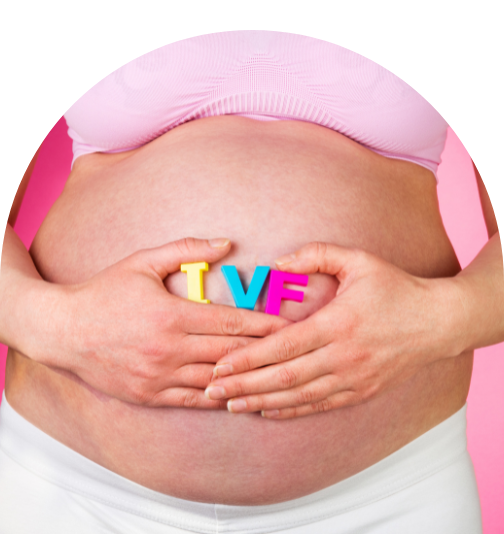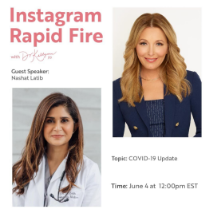How to Boost Your Fertility & Improve Outcomes
When going through IVF, it’s natural to focus solely on the medical procedures and the immediate outcome. However, from a functional fertility perspective, we know that actually, the groundwork for successful IVF cycles is built months in advance—and continues well beyond a positive pregnancy test.
Whether you’re just starting to consider in vitro fertilization (IVF) or have been through unsuccessful IVF cycles, taking a functional approach to fertility can significantly improve your chances of success and a healthy pregnancy. And that’s exactly what our method focuses on!
What is IVF?
In vitro fertilization (IVF) is a multi-step fertility treatment that involves retrieving eggs from a woman’s ovaries, fertilizing them in a lab with sperm, and then implanting the resulting embryo(s) into the uterus.
The process typically involves:
- Ovarian Stimulation: Fertility medications stimulate the ovaries to produce multiple mature eggs.
- Egg Retrieval: A minor surgical procedure collects eggs from the ovaries.
- Sperm Collection & Fertilization: The retrieved eggs are fertilized with sperm in a lab.
- Embryo Culture & Selection: Fertilized eggs develop into embryos, and the healthiest ones are selected.
- Embryo Transfer: A selected embryo is implanted into the uterus.
- Pregnancy Testing: About 9–14 days later, a blood test determines whether implantation was successful.
According to the Centers for Disease Control and Prevention (CDC), over 300,000 IVF cycles are performed in the United States each year, with an average live birth rate of 24% per cycle, though this varies widely based on factors like age and embryo quality. [1]
Since IVF can be physically, emotionally, and financially demanding, giving yourself the best possible chance of success is crucial—and that’s where functional fertility comes in.
Let’s break down the key phases and steps you can take to boost IVF success rates.
Phase 1: The 90-Day Fertility Prep (Pre-IVF)
Did you know that the egg and sperm that create your baby start developing about 90 days before fertilization? That’s why we always recommend couples take a preconception pause and spend at least three months focusing on fertility optimization before beginning IVF treatment.
During this crucial window, there are six major fertility blockers to address:
1. Toxic Exposures
Environmental toxins like BPA, phthalates, and pesticides can negatively impact fertility. [2] These substances can disrupt hormonal balance, impair reproductive health, and make conception more difficult. For example, lead exposure can decrease sperm count, reduce motility, and cause sperm abnormalities in men, while in women, it has been linked to increased miscarriage risk, preterm birth, and low birth weight. [3]
Similarly, endocrine disruptors found in everyday products can interfere with hormone function, leading to fertility issues. [4] For example, parabens—commonly found in cosmetics and personal care products—have been shown to reduce sperm quality and impact testosterone levels. [5] We guide couples on reducing exposures and supporting detoxification.
2. Nutritional Deficiencies
Many couples experience fertility-impacting nutrient deficiencies due to poor diet, stress, gut health issues, or increased nutritional demands before conception.
Specific nutrients like CoQ10, vitamin D, and omega-3s are essential for egg quality and sperm quality. We use comprehensive lab tests to identify and correct these imbalances through targeted dietary changes and supplementation. For example, zinc plays a key role in embryo development and implantation, with studies showing it improves egg maturation and early embryo development—making it a critical nutrient for IVF success. [6]
3. Stress & Sleep
Chronic stress and poor sleep directly impact reproductive hormones. High stress raises cortisol levels, which suppresses gonadotropin-releasing hormone (GnRH) and lowers luteinizing hormone (LH) and follicle-stimulating hormone (FSH), disrupting ovulation and menstrual cycles. [7]
Lack of sleep makes this worse by further increasing cortisol and altering hormones that regulate metabolism and fertility. Research shows women who get high-quality sleep during IVF experience higher pregnancy rates, reinforcing sleep’s role in fertility success. [8]
4. Underlying Conditions
Issues like polycystic ovary syndrome (PCOS), fibroids, endometriosis, and thyroid disorders can hinder fertility. PCOS disrupts ovulation due to hormonal imbalances, while fibroids can block embryo implantation. Endometriosis can cause inflammation and scarring, which may obstruct the fallopian tubes. Thyroid disorders affect menstrual cycles and ovulation, further complicating fertility. [9]
We use functional lab testing to uncover the root causes of infertility and tailor treatment options to improve fertility outcomes—even if you have complications. For example, many women with PCOS believe pregnancy is out of reach, but research shows lifestyle modifications—like dietary changes and exercise—can restore ovulation and improve pregnancy rates. [10]
5. Poor Egg Quality
Egg quality is critical for IVF success because healthier eggs have a better chance of fertilization, normal embryo development, and implantation. Poor egg quality increases the risk of chromosomal abnormalities, which can lead to failed implantation or miscarriage. Aging, oxidative stress, and hormonal imbalances can negatively affect egg maturation and viability.
In the pre-IVF phase, improving egg quality can make a significant difference. We often aim to support healthy eggs through the supplementation of key nutrients. For example, CoQ10 supports mitochondrial function, improving cellular energy production in eggs, while myo-inositol helps regulate ovarian function, particularly in women with PCOS. [11]
We also address nutrient gaps through food. A diet rich in antioxidants from fruits, vegetables, and healthy fats helps protect eggs from oxidative stress, while stable blood sugar levels support hormonal balance and egg maturation.
6. Poor Sperm Quality
Sperm health is just as important in IVF, as poor quality can lead to fertilization problems, slow embryo growth, or early pregnancy loss. Again, we aim to improve sperm quality through nutrition. Nutrients like zinc and folic acid support sperm count and motility, while selenium and vitamin E help reduce oxidative stress, which can damage sperm DNA. Studies have found that a Mediterranean-style diet with healthy fats and protein has been linked to better sperm quality. [12] Additionally, avoiding prolonged heat exposure from hot tubs, saunas, and tight clothing, as well as reducing exposure to EMFs (such as carrying cell phones in a front pocket), can help maintain sperm integrity.
Research indicates that adopting a healthy lifestyle before starting IVF can improve pregnancy rates. For example, a study published in Frontiers in Nutrition found that women who followed a balanced diet rich in fruits, vegetables, and whole grains before IVF had better embryo development and higher pregnancy rates. [13]
Similarly, a study in Human Reproduction Open reported that women who received lifestyle education on diet and physical activity before IVF improved their habits and experienced higher pregnancy rates compared to those who did not receive such education. [14] These findings suggest that improving health before IVF can enhance fertility outcomes.
Phase 2: Supporting Your Body Throughout IVF
IVF is a taxing process, both physically and emotionally. As you progress through stimulation, egg retrieval, and embryo transfer, supporting your body’s needs is essential.
Here are some key aspects to focus on:
Targeted Supplementation
Certain supplements can help support your body during IVF by improving egg quality, hormone balance, and overall reproductive function. For instance, melatonin, known for regulating sleep, also acts as an antioxidant that may improve egg quality and increase pregnancy rates in IVF. [15]
Myo-inositol, a nutrient that helps with insulin regulation, has been shown to improve ovarian function and fertilization rates, particularly in women with PCOS. [16]
L-arginine, an amino acid that promotes blood flow, has been explored for its potential benefits, though research on its impact on live birth rates remains inconclusive. [17] Talk to your doctor before adding any supplements to your routine to ensure they’re right for you.
Nutrient-Dense Diet
Consuming a variety of colorful fruits and vegetables, quality proteins, and healthy fats provides essential micronutrients and antioxidants that support your body during IVF.
A study published in Scientific Reports found that higher consumption of dietary antioxidants is associated with a lower risk of female infertility. [18]
Antioxidants from these foods help reduce oxidative stress, which can negatively impact egg quality and fertility. Incorporating lean proteins and healthy fats, such as those found in fish and nuts, supports hormone production and overall reproductive health.
Gentle Movement
While you’ll need to avoid intense exercise, light activities like walking, prenatal yoga, and swimming can help reduce stress and promote circulation. Research shows that moderate movement during ovarian stimulation lowers stress without negatively impacting IVF outcomes. [19] Better blood flow supports reproductive health, which may improve implantation and overall IVF success.
Mind-Body Practices
Incorporating techniques like meditation, acupuncture, and deep breathing can help manage the emotional challenges of IVF and may even improve success rates. A study found that women who received regular acupuncture treatments alongside IVF had a 42.5% clinical pregnancy rate, compared to 26.3% in the control group. [20] These practices can reduce stress and promote relaxation, creating a more favorable environment for conception.
Communication with Your Fertility Doctor
Maintaining open communication with your fertility doctor and specialists is crucial during IVF. Sharing your feelings, asking questions, and discussing any concerns can improve understanding and trust. Effective communication has been shown to improve patients’ coping abilities and adherence to infertility treatments. [21]
Phase 3: Nurturing Your Pregnancy (Post-IVF)
After your embryo transfer, the two-week wait can feel like forever. Most clinics schedule a blood test around 9 to 14 days later to check for pregnancy hormones. If your IVF cycle is successful, congratulations! But the fertility journey isn’t over yet. The first trimester is a critical time for fetal development, and supporting your body remains a top priority.
Here’s what we focus on post-embryo transfer:
Progesterone Support
Progesterone is the hormone that helps your uterus maintain a pregnancy, preventing early miscarriage. During IVF, your body may not produce enough on its own, so supplementation is often needed. Your doctor willWe closely monitor your levels and may recommend progesterone injections, vaginal suppositories, or oral progesterone to ensure a stable pregnancy. Keeping progesterone levels in check helps the embryo stay implanted and supports early growth, making this phase just as important as the transfer itself.
Nutrient Optimization
During pregnancy, your body requires extra nutrients to support your baby’s growth and your own health. You’ll need about 340 additional calories per day in the second trimester and 450 extra calories daily in the third trimester. [22] These calories should come from nutritious sources like lean proteins, whole grains, fruits, and vegetables. Key nutrients include folate (preferably in its active methylated form, 5-MTHF), which helps prevent neural tube defects, and iron, essential for making the extra blood needed during pregnancy.
As functional fertility specialists, we work with you to adjust your diet and supplements to meet these increased demands, ensuring both you and your baby get the necessary nutrients.
Toxin Avoidance
During pregnancy, it’s important to minimize exposure to harmful chemicals to protect your developing baby. For example, glyphosate, a common herbicide, has been linked to lower birth weights and a higher risk of preterm births. To reduce such risks, we guide you in choosing products and foods free from harmful substances (such as choosing organic produce over conventional), helping you create a safer environment for you and your baby.
Stress Management
Pregnancy after IVF can bring a mix of joy and anxiety. Managing stress is crucial, as high stress levels before and during pregnancy may lower the chances of a successful outcome. [23] We offer support through stress-reducing practices and resources to help you navigate this emotional journey, promoting a healthier experience for both you and your baby.
By taking a proactive, holistic approach to your pregnancy care, we set the stage for a healthy baby.
Why Combine Functional Fertility with IVF?
Combining functional fertility optimization with IVF can significantly improve your chances of success. While the average live birth rate for IVF in the U.S. is about 24%, this varies based on individual factors. In our practice, clients who integrate functional fertility approaches with IVF have seen success rates climb to 80%.
Here are a few key reasons why this integrative treatment approach works:
Functional Fertility Addresses Root Causes
Instead of just managing symptoms, we focus on identifying and resolving underlying issues that affect fertility. This proactive approach is crucial for enhancing IVF outcomes. On average, couples may need six IVF cycles to achieve a successful pregnancy, as cumulative success rates increase with multiple attempts. [24] By addressing root causes, we aim to reduce this number, making the journey to parenthood more efficient, less costly, and less stressful.
Enhances Egg & Sperm Quality
Optimizing nutrition, reducing exposure to toxins, and supporting overall health can significantly improve the quality of eggs and sperm used in IVF. A diet rich in antioxidants helps protect reproductive cells from oxidative stress, while essential nutrients like omega-3s and CoQ10 support mitochondrial function, which is crucial for egg and sperm energy production. Research has shown that exposure to endocrine-disrupting chemicals, such as BPA and phthalates found in plastics, can negatively impact sperm motility and egg maturation. [25]
Increases Implantation Success
Maintaining a balanced and healthy body creates an optimal environment for embryo implantation and growth. Proper nutrition and regular, moderate exercise enhance blood flow to the uterus, supporting the endometrial lining where the embryo implants. Additionally, managing stress through techniques like meditation or yoga can positively influence hormonal balance, further promoting successful implantation.
Supports a Healthy Pregnancy
Our preconception care sets the foundation for a healthy pregnancy, reducing the risk of complications like gestational diabetes or low birth weight.
Gestational diabetes occurs when your body can’t produce enough insulin during pregnancy, leading to high blood sugar levels that increase the mother’s risk of preeclampsia and cesarean delivery while raising the baby’s chances of excessive birth weight, low blood sugar, and breathing difficulties after birth. Studies show that women with preexisting diabetes who receive preconception care have shown improved blood sugar control during pregnancy, resulting in fewer congenital anomalies and shorter hospital stays. [26]
A baby may have low birth weight if the mother’s body lacks essential nutrients, has poor blood sugar control, or experiences high levels of inflammation—all of which can result from unmanaged health conditions before pregnancy. Poor maternal health can restrict fetal growth, leading to complications such as developmental delays and a higher risk of health issues after birth. By addressing health concerns before conception, we strive to ensure a safer and healthier pregnancy journey.
Offers Personalized Care
We tailor our approach to your unique needs, using advanced testing and targeted interventions to improve IVF outcomes. Unlike traditional fertility care, which often focuses solely on reproductive procedures, functional fertility takes a whole-body approach, identifying underlying imbalances that may be impacting fertility.
By addressing factors like hormonal imbalances, nutrient deficiencies, inflammation, and toxin exposure, we complement standard IVF treatments and improve overall reproductive health. This integrative approach ensures that your body is in the best possible condition for conception and a healthy pregnancy.
By working with a functional fertility specialist alongside your IVF protocol, you’re giving yourself the best possible chance of success.
Conclusion
If you’re considering IVF or have had unsuccessful IVF cycles, we understand how overwhelming it can feel. But we want you to know there is hope – and you don’t have to navigate this fertility journey alone.
Our functional fertility approach has helped countless couples optimize their reproductive health, enhance their IVF outcomes, and finally achieve their dream of parenthood. If you’re ready to take a proactive, holistic approach to your fertility, we invite you to our free, on-demand masterclass to learn more about our proven protocols.
Remember, IVF success starts well before you step foot in the fertility clinic. By laying the groundwork now, you’re not just increasing your chances of success – you’re setting the stage for a healthy baby and a thriving future. Let’s work together to make your fertility dreams a reality.








